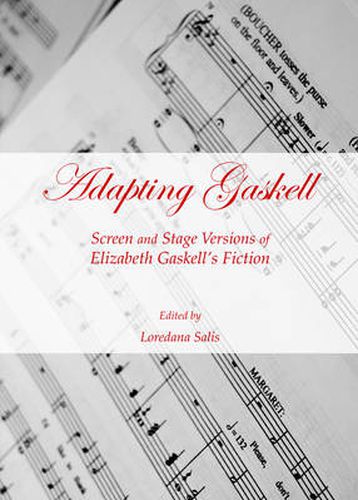Readings Newsletter
Become a Readings Member to make your shopping experience even easier.
Sign in or sign up for free!
You’re not far away from qualifying for FREE standard shipping within Australia
You’ve qualified for FREE standard shipping within Australia
The cart is loading…






This book offers a range of perspectives on Elizabeth Gaskell and adaptation. The contributors - Alan Shelston, Raffaella Antinucci, Thomas Recchio, Brenda McKay, Katherine Byrne, Patricia Marchesi, Marcia Marchesi and Loredana Salis - discuss the afterlives of Gaskell’s fiction, from the author as adaptor of her own work to the role of the BBC in re-inventing Gaskell’s narratives. Loredana Salis is to be congratulated for bringing together a collection that tackles the remediation of Gaskell’s fiction from Gaskell’s own time to the 21st century, enabling her to join those authors, most prominently, Shakespeare, Austen and Dickens, who have received full-length book studies on adaptations of their work. The collection, as a whole, seems to confirm the notion that since the inception of film, the number of adaptations of an author’s work equates to the writer’s canonical status. No doubt, this book will prompt many more investigations into the adaptability of Elizabeth Gaskell’s fiction. - Deborah Cartmell, De Montfort University, Leicester
$9.00 standard shipping within Australia
FREE standard shipping within Australia for orders over $100.00
Express & International shipping calculated at checkout
Stock availability can be subject to change without notice. We recommend calling the shop or contacting our online team to check availability of low stock items. Please see our Shopping Online page for more details.
This book offers a range of perspectives on Elizabeth Gaskell and adaptation. The contributors - Alan Shelston, Raffaella Antinucci, Thomas Recchio, Brenda McKay, Katherine Byrne, Patricia Marchesi, Marcia Marchesi and Loredana Salis - discuss the afterlives of Gaskell’s fiction, from the author as adaptor of her own work to the role of the BBC in re-inventing Gaskell’s narratives. Loredana Salis is to be congratulated for bringing together a collection that tackles the remediation of Gaskell’s fiction from Gaskell’s own time to the 21st century, enabling her to join those authors, most prominently, Shakespeare, Austen and Dickens, who have received full-length book studies on adaptations of their work. The collection, as a whole, seems to confirm the notion that since the inception of film, the number of adaptations of an author’s work equates to the writer’s canonical status. No doubt, this book will prompt many more investigations into the adaptability of Elizabeth Gaskell’s fiction. - Deborah Cartmell, De Montfort University, Leicester